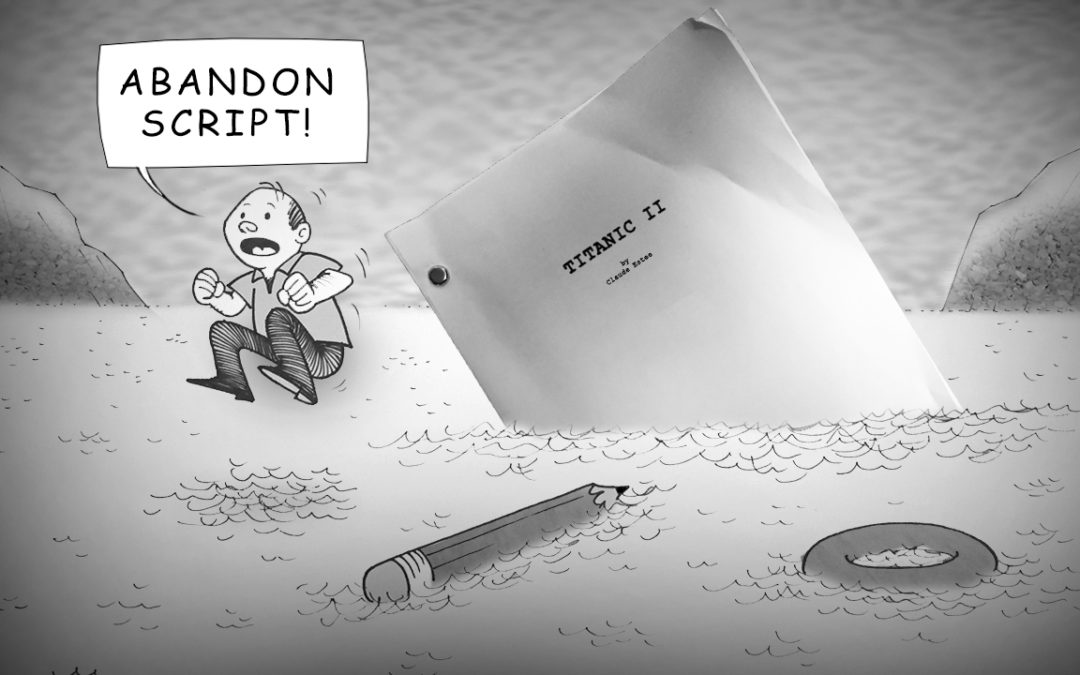Ok. So you’ve skimmed Save the Cat!, logged on to Writer Duet, and bought a tiny fedora. Congratulations! You’re ready to write your first screenplay! But if you’re looking for an edge over all those other MacBook-pecking-future-scribes at your local coffee shop, here is the most important piece of advice to keep in mind:
Finish your script.
This may seem obvious, but the biggest reason most first time feature scripts never get made is because they never get finished. Going from “killer idea” to “completed screenplay” can be daunting, even for experienced writers. Crossing the finish line for the first time is a simple but critical step in the path to success.
Why do most scripts go unfinished? The biggest reason might be a lack of preparation. You start with a general idea of the story and characters, you have some very specific scenes or dialogue in mind, you start typing away and… you hit a wall.
Maybe it’s a logistical issue that bogs down the plot or there’s some unforeseen contradiction in your main character’s motivation. Perhaps you see a movie that deflates you because it’s eerily similar to what you’ve spent the last few months thinking is wholeheartedly original. Whatever the cause, the resulting effect throws you off track: You return to brainstorming, backtrack to change pages you’ve already written, and slowly but surely start lose faith in your writing. Your momentum slows, your enthusiasm wanes, and you ultimately resent this idea that not so long ago was brilliant.
But don’t worry. This happens to everybody. The best remedy is preparation. Do as much work as you can in advance. Everyone wants to write pages, but by putting the time in beforehand creating character studies, a synopsis, beat sheet, and scene-by-scene outline, you’ll confront, and overcome, many of those logistical, structural, or plot related hurdles early. You’ll know when you’re ready to start writing and will be empowered to fully focus your attention on all the necessary pages, not just the first twenty-five. It’s not uncommon for writers to spend more time in prep than they do on their first draft.
Another common mistake is to wait for “the right moment” to write. Yes, it’s wonderful when an idea is so exciting that you must work on it immediately. But if you’re waiting for inspiration to strike, you might find yourself waiting for a really long time.
Instead, get on a schedule. Allocate a specific time of day for writing. Setting aside an hour is great, but if all you can spare is 15 minutes every day, that’s a start. Every page you write gets you closer to your goal. A regular schedule ensures that your script will continue to progress, even if only in small increments.
“The perfect is the enemy of the good.” – Voltaire
A final major impediment to finishing your script is that obsessive desire for perfection. The subconscious hope that if you are careful enough and thoughtful enough and meticulous enough, the first draft will also be the final draft.
That will never, ever happen.
You have countless revisions ahead of you. And there’s a good chance those revisions will be extensive. If you try to prevent the (often creative and rewarding) revision process by rewriting, tweaking, and rethinking during your first draft, you’ll only succeed in prolonging an already arduous process. You also risk making yourself so miserable you give up entirely. Accept revision as an inevitability, stick to your outline, and keep chipping away until you reach the end. The sooner you finish the first draft, the closer you are to the final draft.
Nothing demystifies the process of screenwriting like finishing your first feature script. It can be an endurance test, but by being prepared, staying on schedule, and consistently moving forward, it can be done. And when you print out that first draft and feel the weight of those pages in your hands the accomplishment you feel will be worth all the effort.


Trackbacks/Pingbacks